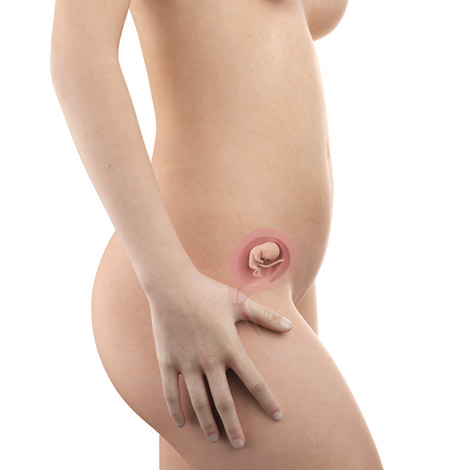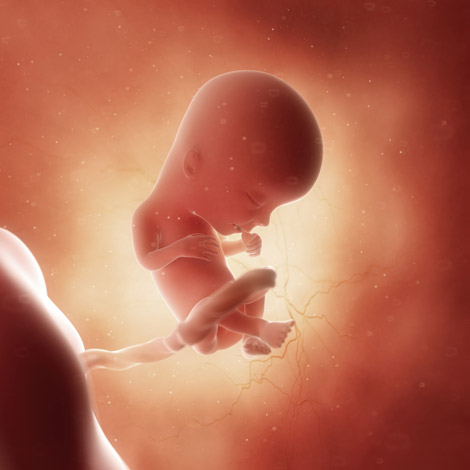Your baby this week
GRAMS IN WEIGHT
More complex parts of the brain are beginning to form.
Your baby's genitals are developing.
Your baby will be swallowing the nutrient rich amniotic fluid.
How big is your baby?
By now, your baby weighs around 23g (under an ounce) and she is roughly the size of an apple, with her head still approximately accounting for half of her length she is now around 7.5cm (just under 3 inches) long.

How big is your baby?
By now, your baby weighs around 23g (under an ounce) and she is roughly the size of an apple, with her head still approximately accounting for half of her length she is now around 7.5cm (just under 3 inches) long.

What does your baby look like?
She is beginning to look more and more like the recognisable baby that she will become as the weeks go past. Her limbs are defined, she has her unique fingerprints and may even be sucking her tiny thumb as she masters the jerky movements she is now capable of.
Changes in your body this week
Your uterus is continuing its growth to accommodate your tiny foetus, and you may find that some of your clothes are becoming tight as your waistline swells. With the extra strain being put on your back and pelvis, it’s worth considering attending pregnancy yoga classes if there are any nearby . This is a great way to stay stretched and supple as your body alters shape. Lots of places also offer postnatal yoga classes for those who pick up the yoga bug!
How your baby is developing
By now some more complex parts of the brain are beginning to form, such as those used for memory and problem solving.
You won’t be able to tell the sex of the baby from an ultrasound scan yet, but her genitals are developing; a baby girl will already have approximately two million eggs in her ovaries and a boy’s testicles will have formed along with a developing penis.

How your baby is developing
By now some more complex parts of the brain are beginning to form, such as those used for memory and problem solving. You won’t be able to tell the sex of the baby from an ultrasound scan yet, but her genitals are developing; a baby girl will already have approximately two million eggs in her ovaries and a boy’s testicles will have formed along with a developing penis.

From this point onwards your baby will be swallowing the nutrient rich amniotic fluid contained inside the amniotic sac. Protein, electrolytes, glucose and carbohydrates all come through this fluid and your baby’s kidneys are functioning to excrete any waste as urine.
Health concerns
You are now entering the second trimester of pregnancy. If you’ve been suffering from morning sickness, fatigue, or you’ve been on a rollercoaster of emotions, you may find that your symptoms are wearing off. Some women worry that this is a sign of there being something wrong with the pregnancy, but it’s actually totally normal. Your placenta is completely formed now and no longer requires the high levels of hCG as it did previously, plus your body is finally getting used to its new, pregnant, state. It’s time for you to start enjoying the next stage. Any worries or concerns can always be discussed with your midwife.
Are there any symptoms you should be looking out for?
Forgetfulness during pregnancy (also known as ‘baby brain’) is very commonly experienced by a lot of expectant mothers. Scientists aren’t clear about why this happens, but it could be due to simply having more on your mind, finding yourself worrying more than normal or simply having too much to think about. Although a study published in 2016 suggests there is a fundamental change which goes on in a mother’s brain as she prepares to become a mother. Techniques and tips for dealing with forgetfulness in pregnancy include:
- keeping an organised, daily diary somewhere prominent in your house
- making sure that all of your scheduled appointments are properly recorded (perhaps use an app on your phone)
- working to a routine so the same things happen at the same time every day
- always keeping your keys, etc. in the same place
Occasionally, forgetfulness can be a sign of prenatal depression. If you’re worried that this could be you, you can speak to your GP, or midwife, who will be able to help you.
Safety first
Sometimes during pregnancy, there may be things which are troubling you but you don’t feel able to confide in anyone about them. Your antenatal appointments with your midwife always take place in a ‘safe’ area where you can feel relaxed and comfortable and, hopefully, able to discuss potentially distressing things or anything that’s worrying you. This could include concerns regarding mental illness, domestic abuse, or drug & alcohol use in the home. This is as much a basic feature of antenatal care as listening for your baby’s heartbeat; you will always be able to confide in your midwife and ask for her help if needed.

Important issues this week
Between 11 weeks, 0 days and 13 weeks, 6 days is the time when more detailed antenatal screening can begin to take place. You may have this done as part of your 12 week scan or it may be a separate appointment. Either way it’s good to think in advance about what you expect, hope and wish for. There are readily available NHS guidelines as to what your baby will be tested for, and there is also the option of an NIPT (non-invasive prenatal blood test) to consider for a few weeks’ time. This is not routinely offered on the NHS but is widely available privately. The high accuracy rate of this test, plus the fact that risk to the baby is removed (unlike the amniocentesis test) means that more and more women are electing to have NIPT to assess the chance of whether their baby will be born with a chromosonal condition.
Keeping fit, staying healthy
Hopefully by now your morning sickness and tiredness are beginning to tail off and you can start to prepare your body for growing larger. Your uterus is continuing to expand rapidly and it’s worth thinking about the strain that this will ultimately place on your pelvis and back. It’s inevitable that you will gain extra weight as a normal part of pregnancy, but by exercising regularly you can reduce the impact on your body. As well as those feel-good endorphins, exercise also promotes strength, muscle tone and endurance which can help you prepare for labour.
Looking forward; planning ahead
Many women feel a slight disorientation towards their body image during pregnancy. By week 13 your shape will probably have begun changing to accommodate your baby – but it has a long way to go yet.
If you aren’t feeling too comfortable about blooming into your pregnancy, it’s worth considering the plus points of all the hormones coursing through you right now. You will probably have thicker, more lustrous hair to play with that looks full and shiny, your skin tone and colour may have altered, meaning that new and different colours of make-up will suit you and there is now a wider than ever selection of maternity clothes available. Back in the day, women had the choice of a pair of stretchy leggings or a fetching, all-enveloping smock to wear. Not so these days! Lots of high street shops (TopShop, New Look) have a maternity range to choose from with the same vibrant, funky styles that are offered to their non-pregnant customers. So why not embrace your body’s changing shape and love it. After all – it will soon be providing you with a newborn baby.



